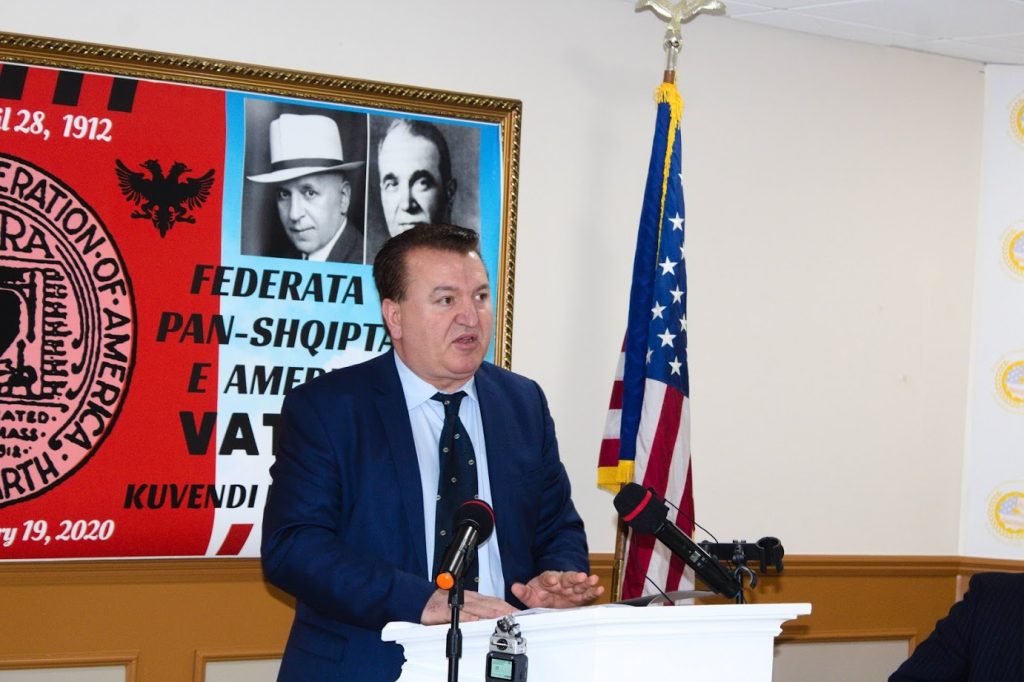
By Elmi Berisha/
President of The Pan-Albanian Federation of America VATRA/
The opinion piece “Let Bill Clinton’s failed Kosovo strategy wither amid the COVID-19 pandemic,” published by Washington Times on 22 April 2020 by J. Michael Waller is factually incorrect and dangerously inflammatory. Although his position is articulated clearly in the title, his opinion is not informed by facts nor reality. The US policy in Kosovo has been shaped and defined by meaningful bipartisanship in Washington.
Mr. Waller, a Senior Analyst for Strategy at the Center for Security Policy, should recall that President George H. W. Bush sent a letter on December 1992 to Slobodan Milosevic, which is documented and referred to as “Christmas Warning”. In it, then President Bush Senior warned Serbian leader to keep away from Kosovo to avoid military action. Then, it is was during the presidency of George W. Bush that Kosovo was recognized by the United States. Throughout the 1980s and 1990s, a great number of Republican leaders such as former Secretary of State James Baker, Member of the House of Representatives, the late Benjamin Gilman, former Leader of the Senate, Robert Dole, late Senator John McCain, Senator Malcolm Wallop, Senator Mitch McConnell, Congresswoman Sue Kelly, to mention only a few, have consistently supported Kosovo. The Albanian community in the US has continuously expressed gratitude for their efforts and for introducing resolutions concerning the abuses of human rights by the Serbian forces in the former Yugoslavia.
The author slides further into debunked and perverted misconceptions regarding the 1999 Kosovo War by characterizing it as religious: Muslims vs. Christians. Historically, Albanians including ethnic Albanians of Kosovo belong to three denominations living in harmony: Muslims, Catholics and Orthodox. In fact, mosques, churches and cathedrals stand next to one another in townships and municipalities all around Kosovo. It has been Serbia’s policy to continue to push hard to convince the world that the conflict in Kosovo was of religious nature or that religion was a major component. So, in his piece, Mr. Waller brings back one of the Serbian myths that Kosovo’s conflict was between Christian Serbs and Muslim Albanians. Fact is that the conflict was purely political and the extreme oppression of Albanians at the hands of Serbian authorities fueled by war-crime criminal Slobodan Milosevic resulted in several wars in former Yugoslavia. Furthermore, a senior analyst such as Mr. Waller with knowledge of the region’s history should know that Serbia waged wars against Slovenia and Croatia, constituent republics of the Former Yugoslavia with an overwhelming majority of Catholic Christian populations. It was Milosevic’s nationalist rhetoric coupled with his thirst for Serbia’s domination and control that fueled the conflicts and the breakup of the Yugoslav Federation.
The statement of Mr. Waller that “the breakaway landlocked province has zero strategic value to the United States” has no merit and has been proven false by American politicians on both sides of the isle. As recently as last February, America’s Ambassador to the Republic of Kosovo, Philip Kosnett, nominated by President Trump last year, speaking at meeting with the community in New York stated that the US presence in Kosovo enjoys bipartisan support.
As a matter of accuracy, even the picture of Kosovo that Mr. Waller paints for the readers is incomplete. He opens his piece with descriptions of boulevards and objects named after US Democratic politicians. To be true, the author speaks of Bill Clinton Boulevard, yet sidesteps, literally, George W Bush Boulevard in Prishtina, which runs from Grand Hotel up to the Cathedral of Saint Mother Teresa. This is only one ‘urban’ example that deflates the author’s uninformed position of the physical landscape as well as the US policy on Kosovo. Mr. Waller need only recognize that the Cathedral of Saint Mother Teresa in Kosovo’s capital is dedicated to the founder of Catholic missionaries of charity, who was born in an Albanian family and whose parents were ethnic Albanians of Kosovo.
We wish to thank the editor for allowing the reader to have an informed view based on facts presented in this response.
Elmi Berisha
President of The Pan-Albanian Federation of America VATRA